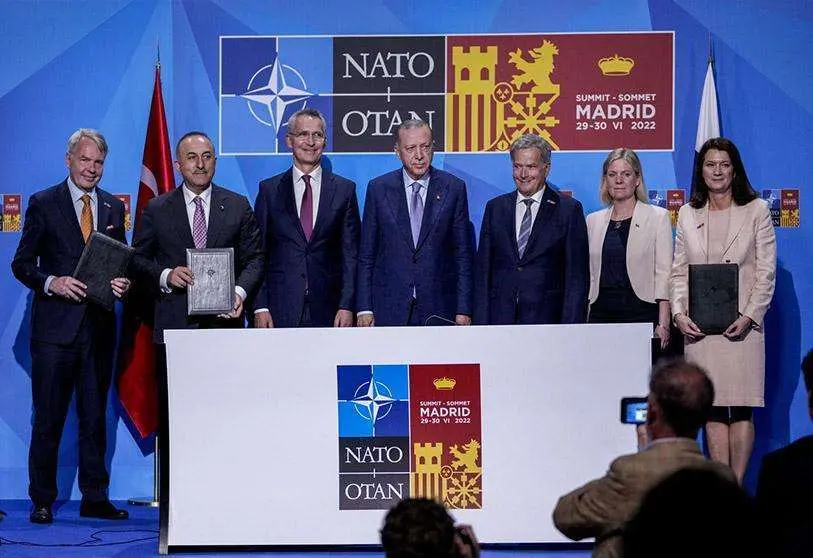Cold War State

NATO was born to confront Russia and today, seventy years later, it once again designates Russia as its main and most immediate threat. It seems as if so much time and so much has passed since the so-called Cold War ended with the defeat of the Soviet Union and the collapse of its communist system. While some were quick to declare the end of history and even the futility of maintaining armies and Defence Ministries, we are now witnessing a major rearmament, a reinforced presence of permanent troops in Eastern Europe, increased attention and vigilance on the southern flank, i.e. Africa, and above all a permanent scrutiny of China, described as a "long-term systemic threat", according to the new Strategic Concept agreed in Madrid.
No matter how much Moscow's propaganda and Beijing's warnings may want to portray NATO as the organisation to blame for this escalation in global tension, the evidence is clear: there is an aggressor, which is President Vladimir Putin's Russia, just as there is a China that makes no secret of its manoeuvres to dominate and occupy the maritime space and subsoil it shares with Taiwan, Malaysia, Vietnam and the Philippines, as well as its dominance and control of the route through the Strait of Malacca, one of the world's hottest bottlenecks.
The NATO summit in Madrid has made a radical shift in its policy of appeasement and an outstretched hand to Russia, which has sought to see the sovereign will of its former satellite countries as an existential threat. The problem for Moscow is that from Helsinki to Bucharest, the countries formerly under Russia's imperialist boot have already learned their lesson and can compare Russia's model of repression of freedoms, whether under the tsars or under Stalinist, Brezhnevian or Putinist dictators, and that offered by a West which, for all its faults, allows individual and collective development and progress in a true democracy like no other system, imperfect if you like, but far superior to the alleged attractiveness of the efficiency in results that Russia or China claim to offer.
The measures and announcements made at the decisive meeting in Madrid show that, as Russian missiles systematically destroy Ukraine, a Cold War has broken out that will sprout hot and intense abscesses all over the world, in short, just as it did in the previous Cold War (1949-1991). And, of course, that the 30 current NATO members, to be joined by Sweden and Finland, are ready to contest it.
The US President, in this case Democrat Joe Biden, has once again set himself up as the leader of the world that NATO represents, with its civilisation and values, even if it is often necessary to call to order members whose behaviour falls outside these parameters, such as Hungary and even more so Turkey.
The reinforcement of the US military presence and capabilities in Spain, Poland, Estonia, Latvia, Lithuania, the United Kingdom, Germany and Italy, shows the scale of the challenge. So far this year alone, the US has already deployed 20,000 additional military personnel in Europe, "to strengthen our ability to respond to Russia's aggressive initiatives", which translates into 100,000 US troops permanently stationed on European soil. Increasing the number of destroyers based at Rota from four to six, and installing a permanent headquarters in Poland for the US 5th Corps, is a very serious warning to Moscow that it will not be given a free hand to dictate to Old Europe.
Also, in line with the threats denounced by Spain in particular, regarding the use of migratory movements for terrorist and destabilising purposes, NATO will strengthen cooperation and aid to Morocco and Mauritania, and will pay special attention to international organised crime, sheltered under jihadism, taking over North Africa and the Middle East.
The Cold War that is already being fought, as in the last edition, also has the nuclear threat hanging over our heads. That threat will persist peremptorily as long as Ukraine is not resolved, and President Putin may believe himself cornered enough to unleash a holocaust. Deterrence of the use of such weapons, solved in the past by the conviction that pressing the nuclear button was to ensure mutual destruction, will require special attention to ensure that no one on either side has an early moment of madness.
And, as in the Cold War of the past, this one will see an unbridled arms race and the accelerated development of new and unprecedented capabilities for space and cyber warfare. As a starting point, NATO finds itself with one of the strongest public support ever for this strategy of rearmament and defence against its greatest threats. That same public opinion will also soon be put to the test when faced with the hardships, shortages and calamities of a conflict that looks set to last a long time. And persuasion will undoubtedly have to be stepped up to help ensure that public opinion does not waver at the slightest difficulty, and that it is aware that freedom and democracy do not come free and require considerable effort and sacrifice.

